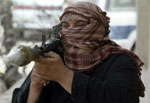 The Hill: How to make sense of the different factions and forces now fighting in Syria and Iraq? The conflict is best understood as a three-way war among ISIS (the radical Sunni offshoot of al Qaeda), moderate Sunnis, and Shiites. In this three-way war, each of the three sides is vying for victory against the other two, and each also represents a much greater cause.
The Hill: How to make sense of the different factions and forces now fighting in Syria and Iraq? The conflict is best understood as a three-way war among ISIS (the radical Sunni offshoot of al Qaeda), moderate Sunnis, and Shiites. In this three-way war, each of the three sides is vying for victory against the other two, and each also represents a much greater cause.
The Hill
By Lawrence Solomon
 How to make sense of the different factions and forces now fighting in Syria and Iraq? The conflict is best understood as a three-way war among ISIS (the radical Sunni offshoot of al Qaeda), moderate Sunnis, and Shiites.
How to make sense of the different factions and forces now fighting in Syria and Iraq? The conflict is best understood as a three-way war among ISIS (the radical Sunni offshoot of al Qaeda), moderate Sunnis, and Shiites.
In this war, ISIS, short for the Islamic State in Iraq and Syria, which on Sunday renamed itself the Islamic State and announced that it has restored the caliphate, is fighting both the moderate Sunnis and the Shiites. The moderate Sunnis are fighting both ISIS and the Shiites. The Shiites are fighting both ISIS and the moderate Sunnis. In this three-way war, each of the three sides is vying for victory against the other two, and each also represents a much greater cause.
ISIS sees itself as al Qaeda’s successor to the jihadi mantle and its newly created Islamic caliphate as the ruler of Muslims everywhere. Its statement announcing the caliphate said, “It is incumbent upon all Muslims to pledge allegiance to [the caliph] and support him. … The legality of all emirates, groups, states, and organizations, becomes null by the expansion of [the caliph’s] authority and arrival of its troops to their areas.” Jihadis everywhere, whether freelancers or affiliated with al Qaeda itself, are now wondering whether they should throw their lot in with the caliphate, the first in modern times.
The moderate Sunnis are supported by most of the established Arab states, including Saudi Arabia, Egypt and Jordan. Their support has less to do with ideology than with survival. Egypt’s leaders and its citizens, which briefly fell under jihadist control in the form of the Muslim Brotherhood, do not relish a repeat. Saudi Arabia and Jordan are directly threatened with invasion and have contingency plans — Egypt reportedly stands ready to send commandos to Saudi Arabia in the event of an ISIS invasion, while Israel’s air force is prepared to repel an ISIS invasion of Jordan.
The Shiites are dominated by Iran, a non-Arab country that has sought control of the Arab states of the Middle East since Ayatollah Khomeini seized power from the shah in 1979. Today, the Iranian Shiites are at the height of their influence, with much of Iraq, Lebanon and Syria under their sway. Once the Shiites under Iran acquire nuclear weapons, they expect to exercise great sway over the balance of the Sunni states, giving them control over the Middle East’s energy resources and leverage over the West.
Although each antagonist in the three-way war is engaged in an existential struggle with the other two, when opportunities arise, each also sometimes gangs up with one of its enemies to defeat the other. The enemy of my enemy is (very temporarily) my friend.
In Iraq, ISIS has been able to sweep through the country, taking large swathes of it back from the Iranian-backed rule of Prime Minister Nouri al-Maliki, a Shiite, thanks to the help of moderate Sunni tribes that al-Maliki had abused. Those are the same moderate Sunnis who threw out al Qaeda in favor of the U.S. during the Sunni Awakening of 2006 and 2007.
In Syria, in contrast, ISIS is in league with Syria’s Iranian-backed government against the moderate Sunnis of the Free Syrian Army. As one example, ISIS and the Syrian government together lay siege to the city of Deir-ez-Zor, a Free Syrian Army stronghold. Iran and its ally, President Bashar Assad’s Syria, have even funded ISIS, to enable it to take on the Free Syrian Army.
But these are temporary alliances, with no pretense of enduring friendship and no hope of recreating the multicultural, multi-ethnic Iraq and Syria of recent memory. In this three-way war, there will be, at most, one victor.
Solomon is a columnist with Canada’s National Post and a policy analyst with Probe International.


